
Marilyn Manson is an American rock band formed by namesake lead singer Marilyn Manson and guitarist Daisy Berkowitz in Fort Lauderdale, Florida, in 1989. Originally named Marilyn Manson & the Spooky Kids, they gained a local cult following in South Florida in the early 1990s with their theatrical live performances. In 1993, they were the first act signed to Trent Reznor's Nothing Records label. Until 1996, the name of each member was created by combining the first name of a female sex symbol and the last name of a male serial killer—for example, Marilyn Monroe and Charles Manson. Their lineup has changed between many of their album releases; the eponymous lead singer is the only remaining original member.

Holy Wood (In the Shadow of the Valley of Death) is the fourth studio album by American rock band Marilyn Manson. It was released on November 11, 2000, by Nothing and Interscope Records. A rock opera concept album, it is the final installment of a triptych that also included Antichrist Superstar (1996), and marked a return to the industrial metal style of the band's earlier work, after the glam rock-influenced production of Mechanical Animals (1998). After its release, the band's eponymous vocalist said that the overarching story within the trilogy is presented in reverse chronological order: Holy Wood, therefore, begins the narrative.
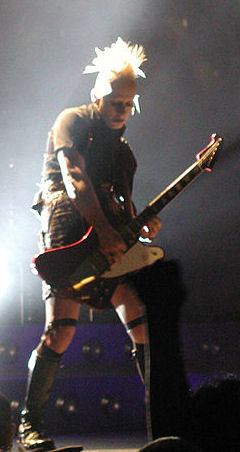
Tim Skold is a Swedish musician and record producer who produces solo work and has also collaborated with multiple musical groups including Shotgun Messiah, KMFDM, Marilyn Manson and Motionless in White.

Antichrist Superstar is the second studio album by American rock band Marilyn Manson. It was released on October 8, 1996, by Nothing and Interscope Records. It was recorded at Nothing Studios in New Orleans and produced by the band's eponymous vocalist along with Sean Beavan, former Skinny Puppy producer Dave Ogilvie and Trent Reznor of Nine Inch Nails. The recording of the album was marred by excessive drug use, which provoked a high level of antagonism between band members. Consequently, it was their last release to feature contributions from founding guitarist Daisy Berkowitz, who was acrimoniously fired partway through recording.

Mechanical Animals is the third studio album by American rock band Marilyn Manson. It was released on September 15, 1998, by Interscope Records. The album marked a major shift from the industrial metal and alternative metal styles of the band's earlier efforts, into an experimentation with 1970s glam rock with industrial rock and electronic rock styles. As their first release following the success of their breakthrough album, 1996's Antichrist Superstar, Mechanical Animals' themes primarily deals with the trappings of fame and drug abuse.

Jeordie Osbourne White, better known Twiggy Ramirez or simply Twiggy, is an American musician, mostly known as the former bassist and guitarist of the rock band Marilyn Manson. Previously, he was the bassist for A Perfect Circle and a touring member of Nine Inch Nails, and is currently the vocalist for Goon Moon. He left Marilyn Manson in 2002, later rejoined the band in 2008, and was dismissed in 2017. He has been a principal songwriter for the band and has also contributed to some of the Desert Sessions recordings. He also hosted the Hour of Goon podcast with fellow musician Fred Sablan, on the Starburns Audio network.
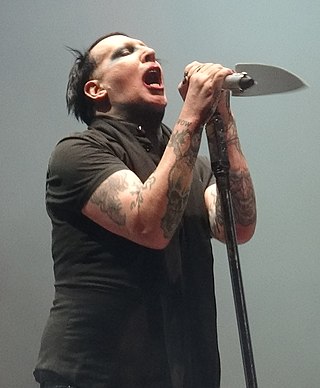
Brian Hugh Warner, known professionally as Marilyn Manson, is an American rock musician. He came to prominence as the lead singer of the band that shares his name, of which he remains the only constant member since its formation in 1989. Known for his controversial stage personality, his stage name was formed by combining the names of two opposing American cultural icons: actress Marilyn Monroe and cult leader Charles Manson.
"The End" is an epic song by the American rock band the Doors. Lead singer Jim Morrison initially wrote the lyrics about his break up with an ex-girlfriend, Mary Werbelow, but it evolved through months of performances at the Whisky a Go Go into a much longer song. The Doors recorded a nearly 12-minute version for their self-titled debut album, which was released on January 4, 1967.

"Disposable Teens" is a song by American rock band Marilyn Manson. It was released on November 7, 2000 as the lead single from their fourth full-length studio album, Holy Wood (2000).

John William Lowery, who is known by the stage name John 5, is an American guitarist. Lowery first took the stage name in 1998 when he left David Lee Roth's solo band and joined the rock band Marilyn Manson. Lowery later became the guitarist for Rob Zombie, and in 2022, became the touring guitarist for Mötley Crüe, being promoted to a full member the following year.

Waylon Albright "Shooter" Jennings is an American musician and record producer. He is the son of country singers Waylon Jennings and Jessi Colter. In a career spanning three decades, Jennings has explored a variety of musical genres.

"The Beautiful People" is a song by American rock band Marilyn Manson. It was released as the lead single from the band's second studio album, Antichrist Superstar, in September 1996. Classified as alternative metal, the song was written by frontman Marilyn Manson and Twiggy Ramirez, and was produced by Trent Reznor, Dave Ogilvie and Manson.
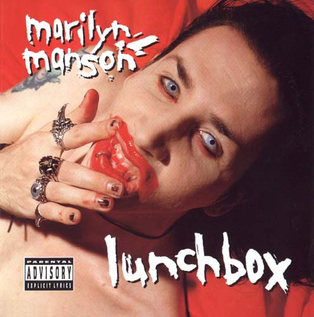
"Lunchbox" is a song by American rock band Marilyn Manson. It was released as the second single from their debut album, Portrait of an American Family (1994). A heavy metal song that features elements of death metal, industrial music and punk rock, "Lunchbox" was written by the band's eponymous vocalist, Daisy Berkowitz, and Gidget Gein, and produced by Manson with Trent Reznor. According to Berkowitz, the track was written as the frontman's plea to be left alone; it was also inspired by a time where Manson defended himself from bullies with a Kiss lunchbox. The track features elements of "Fire" (1968) performed by Arthur Brown, a musician who influenced the band.

"Tourniquet" is song by American rock band Marilyn Manson. It was released as the second major-label single from their second studio album Antichrist Superstar. The image this song conveys is that of the main character in a world of sorrow and self-pity, prior to his transformation into the Little Horn. It was written by frontman Marilyn Manson, co-founder Daisy Berkowitz and longtime bassist and guitarist Twiggy Ramirez. Like many other songs from Antichrist Superstar, the song's lyrics are based on a dream Manson had.
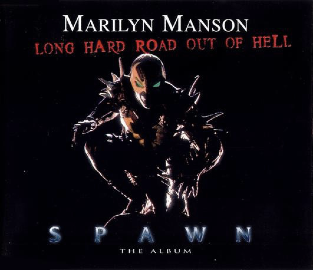
"Long Hard Road Out of Hell" is a song by American rock band Marilyn Manson and British trip hop band Sneaker Pimps. It was released as a single from the soundtrack to the 1997 motion picture Spawn. An arena rock and gothic rock song, "Long Hard Road Out of Hell" was written by Marilyn Manson and Twiggy Ramirez and produced by Manson and Sean Beavan. Its lyrics are about self-loathing and its title is derived from John Milton's Paradise Lost (1667). After the track was written, the Sneaker Pimps' Kelli Ali was recruited to perform background vocals on it, as the Spawn soundtrack featured collaborations between hard rock artists and electronic music artists. The Sneaker Pimps were dissatisfied with the final track and wanted a remix of it to be released as a single instead; conversely, Manson deemed it a personal favorite.
"Bad Girl" is a song by Canadian singer Avril Lavigne for her fifth studio album, Avril Lavigne (2013). It was written by Lavigne, Chad Kroeger and David Hodges, while the song was produced by Kroeger and Hodges and features guest vocals by American singer Marilyn Manson. After hearing "Bad Girl", Lavigne thought Manson would complement the track. Manson added his vocals to the song early one morning, and Lavigne was honored to be able to collaborate with him.
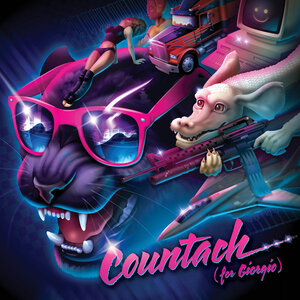
Countach (For Giorgio) is the seventh studio album by Shooter Jennings, released on February 26, 2016 on vinyl through Jennings' own Black Country Rock label. A 16-bit music video for the song "Cat People (Putting Out Fire)" featuring Marilyn Manson was released on August 1.

"We Are Chaos" is a song by American rock band Marilyn Manson, released on July 29, 2020, through Loma Vista Recordings as the lead single from their eleventh studio album of the same name. The song was written and produced by Manson and Shooter Jennings; Jennings wanted the song to sound like the music of Jeff Lynne and Elvis Presley. "We Are Chaos" received generally positive reviews upon release, with numerous publications comparing it to the work of The Beatles. It was also a commercial success, entering the top five of numerous music download and airplay charts, and was their third top ten hit on Billboard's Mainstream Rock Chart. A music video for the song was created by Matt Mahurin, which featured Manson's likeness being inserted into a series of surrealistic vignettes.
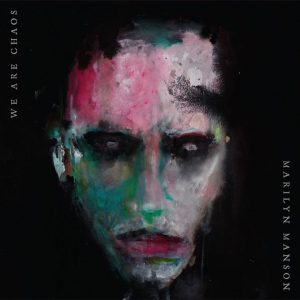
We Are Chaos is the eleventh studio album by American rock band Marilyn Manson. It was produced by Marilyn Manson and Shooter Jennings, and was released on September 11, 2020, by Loma Vista Recordings and Concord Music. The title track and "Don't Chase the Dead" were both issued as singles. The album was a critical and commercial success upon release, garnering mostly positive reviews and becoming their first number one album in Portugal, and their first number one record in Australia since 1998's Mechanical Animals.
"Don't Chase the Dead" is a song by American rock band Marilyn Manson, released on September 10, 2020 by Loma Vista Recordings as the second single from the band's eleventh studio album We Are Chaos. The single was issued as a one-track digital download a day ahead of the album's release. A music video for the song was directed by Travis Shinn, and featured actor Norman Reedus and Manson's wife Lindsay Usich. The track peaked at number 29 on Billboard's Mainstream Rock, making We Are Chaos the band's first studio album since 1998's Mechanical Animals to contain more than one top thirty single on that chart. It was the final single released by the band through Loma Vista before they were dropped by the label in February 2021 following accusations of abuse made against the band's vocalist, allegations he has denied.

















